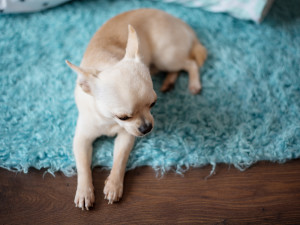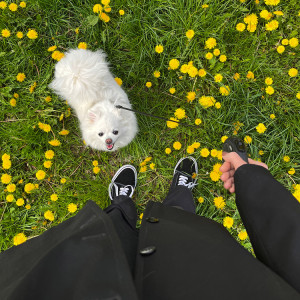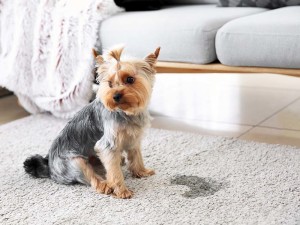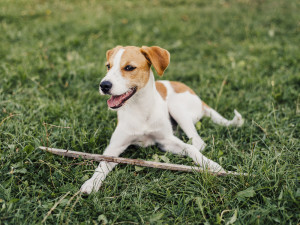
Share Article
In This Article:
Why Does Dog Pee Kill Grass? What Might Affect Urine Damage to Your Lawn? Tips to Protect Your Lawn From Dog Urine How to Get Rid of Dog Pee Spots on Your Lawn
If you want your lawn to be the envy of the neighborhood, your dog likely isn’t helping matters. While you don’t miss the days of house training a puppyopens in new tab, their urine often leaves behind patchy yellow or brown spots in the grass. And unlike dog poop, you can’t just follow along behind them and clean up the mess.
Lawns and dog urine are often mortal enemies, but fortunately there are things you can do to protect your yard — and your sanity.
Why does dog pee kill grass?
Dog urine is rich in nitrogenopens in new tab, a substance which can kill grass in concentrated amounts over time. And yes, most lawn fertilizers contain nitrogen, but it’s all about moderation. A small amount of fertilizer helps keep your yard healthy; too much will kill the grass, burning it in the process.

Dogs have a tendency to pee in the same areas of a yard again and again, leading to overconcentration of nitrogen — and a lawn that looks less than stellar. If you don’t treat your grass, even with just water, it may turn brown or yellowopens in new tab, or even die.
What might affect urine damage to your lawn?
Your dog might love running in your yard (or eating the grass), but the lawn may look far from healthy after regular dog urine damage. Several factors can impact how dog pee affects your yard.
Dog diet
A less-processed, raw, or homemade diet can reduce the amount of nitrogen in dog urine, limiting the damage they do to your lawn. Consider switching out your commercial kibble for wet food or using safe, hydrating fruits — like blueberries, watermelon, or cantaloupe — as treats. Make sure to consult your vet before changing your dog’s diet.
Dog water intake
The more water your dog drinks, the more diluted the nitrogen in their urine will become. Plus, a healthy water intake is good for your dog’s skin, bladder, and digestive health.
Dog gender
Many people believe that female dogs cause more damage to grass than male dogs, but this has more to do with how dogs pee than their sex. Male dogs usually lift their legs and prefer to pee on things like trees and fences. Female dogs, meanwhile, tend to squat and urinate directly on the grass, causing more damage to the lawn.
Dog breed
Your dog’s breed has no impact on whether their urine will harm your lawn. Some dogs may have more nitrogen in their urine, but that’s likely a result of diet or water intake, not breed.
Tips to protect your lawn from dog urine
As much as you love your dog, they may keep your lawn from looking green and healthy. Fortunately, there are some things you can do to prevent dog urine from killing your grass.
Fertilize less.
Many fertilizers contain nitrogen, which is also in dog urine. The combination of both fertilizer and your dog’s pee could easily burn your lawn, so fertilize less — or not at all — in areas where your dog urinates.
Replant urine-damaged areas.
If your grass is brown and dead in certain spots where your dog frequently urinates, consider reseeding with a more urine-resistant strain of grassopens in new tab, like ryegrass or fescue.
Create a specific pee spot.
As with most dog-related issues, training can save the day when it comes to keeping your lawn pristine. Train your dog to eliminate in a specific area to save the rest of your yard. You can even purchase a specific grass patch for dogs to protect the rest of your yard.
Water the grass that has been urinated on.
Regular wateringopens in new tab of the areas where your dog pees can help save dying grass in some cases. Water can dilute the urine and reduce the effects of nitrogen on your lawn.
Hydrate your dog.
Speaking of water, keeping your dog hydrated isn’t just good for their health — it’s good for your lawn, too. Encourage your pup to drink more water so the nitrogen in their urine is less concentrated, and therefore less damaging to your grass.
Give your dog dietary supplements.
Dog diet supplements are available that make the nitrogen in dog urine less harmful to your grass. Always be cautious when using supplements and talk to your vet before adding anything to your dog’s diet.
How to get rid of dog pee spots on your lawn
If you want to grow grass with dogs using the yard, it’s best to prepare yourself for extra grass maintenance. When you notice dog pee spots on your lawn, make sure to water the grass where your dog has done their business for the best chance of saving your lawn.
Here are a few other tips for getting rid of urine spots on grass:
Apply lawn treatments to the grass to remove nitrogen and salts from the soil. Be sure to use only dog-safe treatments.
Reseed any dead patches of grass. Choose the best grass for dogs by looking for species that are more resistant to dog urine.
Train your dog to use a designated “bathroom area” in the yard to keep any urine spots in one location.
FAQs (People also ask)
Will grass grow back after dog urine damage?
Once your dog’s urine has damaged your lawn, the grass may grow back… or it may not. If the grass is just yellow, you may be able to water it back to health, but if it’s already brown, it’s time to replant with new sod.
How can I stop dog urine from killing grass naturally?
There are several things you can do to prevent your dog’s urine from killing your grass — without the use of chemical treatments:
Water your lawn immediately after your dog does their business to help dilute the urine.
Train your dog to urinate in a specific spot in the yard, preferably a space with mulch or gravel instead of grass.
Encourage your dog to drink more water, which can help reduce the nitrogen in their urine.
What can I give my dog to neutralize their urine?
Look for a premium, high-quality dog food with more digestible protein, which can help reduce the nitrogen content of dog pee. You can also feed your dog canned or wet food to help dilute their urine. Supplements are available that claim to reduce the nitrogen in your dog’s pee, but you should talk to your vet before giving any supplement to your dog.
References
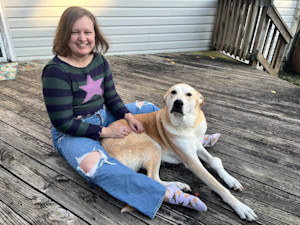
Savannah Admire
Savannah Admire is a writer and pet mom to two dogs and a cat. Under the name Savannah Cooper, she has published poetry in 40 different publications, as well as a poetry book, Mother Viper (2025). When she’s not writing, you can find her reading, taking photos, or volunteering as a content creator for her local community theatre. As a pets writer, she focuses on cat and dog behavior and pet parenthood. She currently lives in Western Maryland.
Related articles
How Long Can Puppies Hold Their Pee?
You shouldn’t make them cross their legs for long!
![Tan Chihuahua dog laying on aqua rug looking down shamefully]()
“Why Is My Adult Dog Peeing In The House?”
How to re-housetrain a dog of any age.
![feeding black dog rice water to help relieve diarrhea]()
Vet-Approved Diarrhea Treatments
Shudder. It happens to all of us.
![A girl stands with her small white dog among dandelions.]()
How to Treat Urinary Tract Infections (UTIs) in Dogs
If your pup’s bathroom habits have changed, they might have a UTI. Here’s how to help.
![dog near pee spot on carpet]()
How to Remove Dog Pee and Other Stains From Carpet—Without Harsh Chemicals
The next time your dog pees on your favorite rug, be prepared with this simple, three-step method.
![Dog sitting in the grass with a stick.]()
How to Keep your Lawn Free from Urine Spots
Hint: Those “grass-saving” supplements for dogs don’t work — and may even harm your pup.

